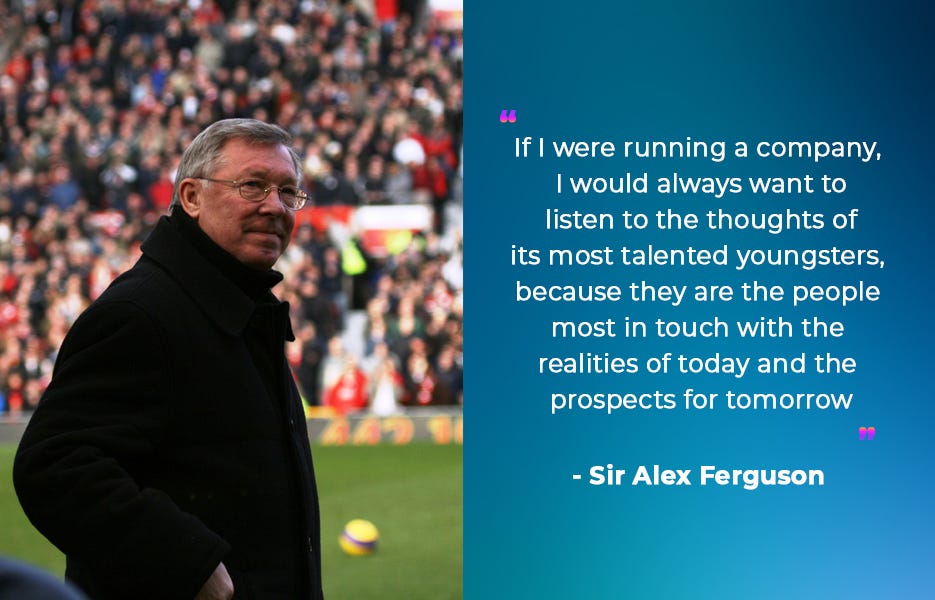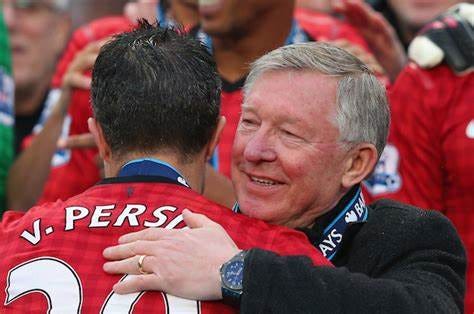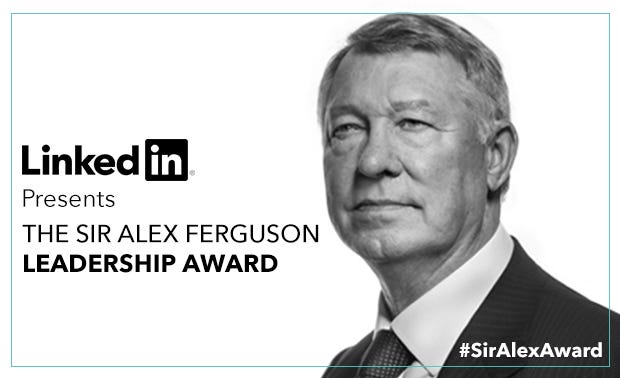Team Dynamics Through Sports
Lessons in Teamwork from Sir Alex Ferguson: Transcending Football to Fuel Success in the Energy Consulting Industry
In the annals of football history, one name stands out above the rest: Sir Alex Ferguson. His managerial career, most notably his tenure at Manchester United, was not just marked by an array of silverware but also by his masterful orchestration of teamwork. Beyond the football pitch, the principles and practices that defined Sir Alex's leadership are invaluable lessons that transcend the realm of sports. For a consulting company operating in the dynamic and demanding energy industry, where collaboration and synergy are paramount, the Sir Alex Ferguson playbook offers invaluable insights into achieving and sustaining success.
Leadership & vision
One of the cornerstones of Sir Alex's leadership was his unwavering commitment to a clear and ambitious vision. He knew precisely what he sought to accomplish with Manchester United and, more crucially, knew how to convey this vision to his team. In the workplace, this equates to having a shared vision that serves as a guiding star. A strong leader, akin to Ferguson, not only articulates this vision but also fosters buy-in from each team member, thus ensuring that everyone is rowing in the same direction.
This is what makes vision important - it gives meaning to activities. You may recall in my maiden article that introduces Pontem Africa, I talked about how articulating vision and purpose can make a once meaningless activity have meaning. It is no different in this context. He stretched the capabilities of his players and the entire team with a vision bigger than them, ensuring that they were held to very high standards. The current coach of Manchester City (Pep Guardiola), in my opinion, has borrowed this attribute from the Great Sir Alex Ferguson. Only few coaches would be winning a game by 3 goals up at half time and still be pushing the team to do more like they were losing.
If you’re going to be a footballer, be a great one. If you’re going to have a dream, dream big.
Sir Alex Ferguson
Adaptability
Throughout his storied career, Sir Alex displayed remarkable adaptability. He was never wedded to a fixed game plan and was ready to pivot in the face of shifting circumstances. This flexibility and willingness to adapt are equally indispensable in the workplace particularly in the energy industry, which operates in a landscape of evolving market conditions, dynamic regulations, and rapidly advancing technologies.
Players know they can trust me which is really important. They know that I had the ability to adapt to change, and they have seen that many times over the years. I think these are important parts of being in control of footballers.
Sir Alex Ferguson
Success in this realm depends upon the ability to recalibrate strategies, just as Ferguson's teams did to stay at the top. For those of us who have spent over a decade or two in the energy industry, I am sure we have heard the word “digital” over a thousand times in the past few years. Yes, digitalization is here to stay, and it is moving faster than a runaway train. I just had to include “runaway train”; I am a fan of the Mission Impossible, and Elton John and Eric Clapton did an amazing job with soundtrack - Runaway Train (I love the song!) It means that people and teams have to be adaptable to the ever fast changing world of digitalization.
Empowerment
In the storied career of Sir Alex Ferguson, a key component of his managerial philosophy was empowerment. He trusted his players with decision-making and bestowed upon them the responsibility to perform on the field. This practice of empowerment, which played a significant role in his success, offers critical insights for businesses looking to maximize their workforce's potential.
Trust as the Bedrock - At the heart of Sir Alex Ferguson's approach to empowerment was trust. He placed immense faith in his players, knowing that they were capable of making decisions in high-pressure situations. This trust was not blind but earned through the consistent display of commitment, dedication, and skill. In the workplace, building trust is equally vital. Leaders must demonstrate trust in their teams' abilities and encourage a culture of trustworthiness. Trust is the foundation upon which empowerment is built.
Responsibility and Decision-Making - Empowerment in Sir Alex's teams meant more than just trust; it also meant that players had the authority to make critical decisions on the field. They were empowered to act on their own initiative, whether it was changing tactics mid-game or executing a crucial play.
You are responsible to each other because when you win a game of football, you only need eight players to perform well.
Sir Alex Ferguson
In the energy consulting industry, a similar approach can be applied. Empowering employees to make decisions within their scope of work fosters a sense of ownership and accountability. It allows them to react quickly to changing circumstances and take the lead in resolving issues.
Learning Through Empowerment - Sir Alex understood that true empowerment is a learning process. He allowed his players to make mistakes, learn from them, and come back stronger. Similarly, in the workplace, empowerment comes with the acknowledgment that errors can occur. However, these errors should be viewed as valuable learning opportunities. Encouraging employees to learn from their mistakes and providing constructive feedback promotes growth and development.
Ownership and Accountability - Empowerment goes hand in hand with ownership and accountability. When individuals are entrusted with responsibilities, they take ownership of their roles. They become accountable for their actions and decisions, knowing that their choices impact the team's overall performance. In the energy consulting industry, employees who feel a sense of ownership are more engaged, committed, and driven to deliver exceptional results.
Encouraging Initiative - Sir Alex's empowered teams were characterized by their initiative. They were proactive, taking the lead when needed, and not waiting for instructions. In the workplace, this initiative is a powerful asset. Encouraging employees to take the initiative promotes a culture of innovation and problem-solving, enabling the organization to adapt swiftly to changing conditions and seize opportunities.
Balancing Empowerment and Guidance - Empowerment, however, should not be confused with a lack of guidance. Sir Alex provided his players with a framework of objectives and strategies, guiding them while allowing them the freedom to make decisions within those parameters. Similarly, leaders in the energy industry should provide clear objectives and expectations, ensuring that empowerment is balanced with guidance and a shared vision.
Recognition and Celebration - Recognizing and celebrating individual and team achievements are pivotal components of empowerment. Sir Alex Ferguson praised his players' successes and acknowledged their contributions. In the workplace, this recognition is a powerful motivator. It instills a sense of pride and encourages employees to continue striving for excellence.
Empowerment, as epitomized by Sir Alex Ferguson, is a philosophy that drives engagement, fosters initiative, and promotes personal and collective growth. In the energy consulting industry, it empowers employees to take ownership of their roles, make critical decisions, and contribute to the organization's success. By implementing this approach, businesses can create a culture where trust and responsibility intersect to yield excellence, innovation, and long-term success. Sir Alex's legacy reminds us that empowerment is a catalyst for achieving greatness, both on the football field and in the workplace.
Player development: nurturing talent, fostering excellence.
One of Sir Alex's enduring legacies is his talent for nurturing young prospects into world-class players. In the workplace, investing in employee development is non-negotiable. Like Ferguson, companies must cultivate their future leaders and ensure that the team is in a constant state of evolution and growth.
Identifying potential - Sir Alex possessed a keen eye for talent. He had a knack for identifying raw potential in young players and understanding how they could fit into the broader framework of the team. Similarly, in the workplace, recognizing and nurturing the potential of employees is essential. Identifying individuals with the aptitude and drive to excel in their roles is the first step towards building a team of high-performing professionals.
Investment in learning - Sir Alex's commitment to nurturing talent extended to investing in the learning and development of his young players. He created an environment that encouraged continuous growth, where players had access to top-notch coaching and guidance. In the energy consulting industry, investing in employee development is equally pivotal. Just as Ferguson's commitment to youth academies and coaching staff contributed to the growth of his players, providing opportunities for training, mentorship, and upskilling empowers employees to reach their full potential.
Gradual integration - Ferguson rarely thrust young players into the deep end. Instead, he gradually integrated them into the first team, allowing them to acclimatize and gain experience. In the workplace, this approach is just as effective. Allowing new hires or junior team members to gradually adapt to their roles and responsibilities ensures a smoother transition, reduces stress, and fosters long-term growth.
Mentorship guidance - young players at Manchester United benefited from mentorship and guidance, not only from their manager but also from senior players. Experienced stars like Ryan Giggs and Paul Scholes played a pivotal role in shaping the careers of their younger teammates. In the energy consulting industry, mentorship programs provide similar benefits. Seasoned professionals can guide younger employees, helping them navigate the complexities of the industry, develop essential skills, and build lasting careers.
Creating a culture of excellence - Sir Alex Ferguson's commitment to player development was not just about individual growth but also about fostering a culture of excellence. His philosophy trickled down from the senior players to the youth academy, creating a collective sense of striving for greatness.
I have never played for a draw in my life.
Sir Alex Ferguson
In the workplace, a culture of excellence is cultivated when each team member is encouraged to reach their full potential. It results in a high-performing organization that consistently delivers exceptional results.
Succession planning - One of the lesser-known aspects of Ferguson's management was his adept succession planning. He ensured that talented young players could seamlessly take the place of retiring legends. In the energy consulting industry, succession planning is essential. Preparing and grooming employees to assume leadership roles is a strategic move that ensures a smooth transition of talent within the organization.
Cultivating leadership - Ferguson's approach to player development was not just about building players; it was about creating leaders. Many of the players he nurtured went on to become influential leaders in their own right.
In the workplace, fostering leadership skills and a sense of ownership among employees ensures that the organization has a pipeline of capable leaders who can steer it towards the future.
Sir Alex Ferguson's genius in player development teaches us that recognizing and nurturing talent is just the beginning. Creating an environment that encourages growth, learning, and a sense of belonging is equally vital. Businesses in the energy consulting industry can leverage this principle to identify and cultivate talent within their organization, ensuring that their teams are not just equipped with skills but also the drive to achieve excellence. After all, as Ferguson demonstrated on the football pitch, nurturing talent is the key to building a legacy of enduring success.
Team Cohesion - the power of unity in the workplace
Sir Alex Ferguson's managerial brilliance extended far beyond tactics and strategy; it was rooted in his uncanny ability to forge a cohesive unit out of diverse talents. This ability to foster unity and teamwork is one of the most vital lessons any workplace, including the energy consulting industry, can derive from his illustrious career.
In the world of football, as in the professional arena, a team is often a collection of individuals with distinct skill sets, personalities, and backgrounds. Sir Alex recognized that while individual brilliance was certainly important, it was the harmonious blending of these distinct talents that produced extraordinary results. His teams at Manchester United were renowned for their 'never-give-up' attitude and their ability to find strength in unity.
The workplace parallels the football pitch in this respect. In the energy consulting industry, teams are frequently comprised of individuals with diverse skills, ranging from technical expertise to data analysis, project management, and financial acumen. Like the players in a football team, these employees bring unique strengths and backgrounds to the table. However, just as Sir Alex knew, the true magic happens when these diverse elements coalesce into a cohesive and synchronized whole.
Effective teamwork and collaboration in the workplace are not just lofty ideals; they are the linchpin of innovation and effective problem-solving. In a team that operates with seamless cohesion, the strengths of each member are magnified, and their weaknesses are shored up. This balance generates a synergy that transcends what any individual could achieve in isolation.
Think of Sir Alex's Manchester United. Stars like Ryan Giggs, Paul Scholes, and Cristiano Ronaldo shone brightly, but their brilliance was elevated when working in unison with their teammates. The midfield's intricate passing and the forward's precise finishing were a symphony of team cohesion. The same principle applies to the workplace, where diverse teams can tackle complex challenges with creativity, collaboration, and, most importantly, unity.
Team cohesion is not merely a byproduct of shared goals and values; it's also nurtured through strong leadership. Just as Sir Alex instilled a sense of camaraderie and shared purpose in his football squads, effective leaders in the workplace should foster a culture of teamwork. They should encourage open communication, mutual respect, and the willingness to share ideas and knowledge. In doing so, they create an environment where teamwork is not just a buzzword but a living and breathing force that drives the organization forward.
Ultimately, Sir Alex Ferguson's lesson in team cohesion is that individual brilliance can only take a team so far; it is the collective power of teamwork, forged through unity and a shared sense of purpose, that enables the extraordinary. In the energy consulting industry, as in any field, success is often defined by the strength of the team and their capacity to work together seamlessly toward a common goal. Sir Alex's legacy stands as a testament to the enduring truth that a cohesive team is more than the sum of its parts, and its unity is the key to unlocking remarkable achievements.
Consistency
Consistency was a hallmark of Ferguson's tenure. He instilled a winning mentality and work ethic that reverberated through his teams. In the energy consulting industry, consistency is the engine that drives excellence. A steadfast and disciplined approach ensures that every project is executed to the highest standard, thus cultivating a culture of excellence that mirrors the consistency Ferguson demanded.
Resilience
Sir Alex's teams were celebrated for their never-say-die attitude.
At the end of the game, you're going to be six feet away from that trophy, and that's the closest most of you will ever get to it. Don't you dare come back in here without giving it 100%"
Sir Alex Ferguson - 1999 Champions League Final
In the energy industry, setbacks and challenges are par for the course. It is a resilient team that can confront adversity head-on, a quality that Ferguson's teams exemplified and one that is equally critical in the consulting field.
Communication - the lifeline of success
In the realm of football management, Sir Alex Ferguson was not only known for his tactical brilliance but also for his exceptional communication skills. These skills were instrumental in building and sustaining successful teams. For the energy consulting industry, effective communication is equally vital. Here's how lessons from Sir Alex's approach to communication can elevate workplace dynamics and drive success.
Clarity and Transparency - Sir Alex was renowned for his ability to communicate with clarity and transparency. He left no room for ambiguity when setting objectives and expectations. In the workplace, clear and transparent communication is indispensable. When leaders provide precise directions and convey information transparently, employees can align their efforts with organizational goals, resulting in greater efficiency and reduced misunderstandings.
Regular Feedback - Ferguson didn't limit communication to one-way instructions; he actively engaged with his players, providing regular feedback. This continuous feedback loop enabled his players to understand their strengths and areas for improvement. In the energy consulting industry, regular feedback promotes employee growth and development. It encourages individuals to refine their skills and work towards self-improvement, benefiting both the employee and the organization.
Two-Way Dialogue - Communication under Sir Alex was not a monologue; it was a dialogue. He encouraged his players to express their thoughts and ideas. This two-way communication fostered a sense of collaboration and mutual respect. In the workplace, open two-way communication channels enable employees to share ideas, voice concerns, and contribute to decision-making. This inclusivity not only enhances employee engagement but also often leads to innovative solutions to organizational challenges.
Adaptation to Individual Styles - Sir Alex recognized that effective communication required adapting to individual player styles. Some players needed a gentle approach, while others responded better to direct, no-nonsense feedback. This adaptability was vital to bringing out the best in each player. In the energy consulting industry, understanding and accommodating individual communication styles can improve teamwork and foster a harmonious work environment. It ensures that every team member is heard and understood, resulting in greater cohesion.
Crisis Management - Sir Alex excelled in crisis management, a skill that hinged on his ability to communicate calmness and confidence in high-pressure situations. In the energy consulting industry, crises are not uncommon. Effective crisis communication, like Ferguson's, is critical for maintaining stability and reassuring employees and stakeholders.
Motivational Communication - Ferguson was a master motivator. He knew how to communicate in a way that fired up his players and inspired them to give their best. In the workplace, motivational communication is a potent tool. Leaders who can inspire their teams and instill a sense of purpose drive higher levels of commitment and productivity.
Adaptive Communication - Sir Alex's communication style wasn't static. He adapted to changing circumstances and the needs of his team. In the workplace, adaptability in communication is vital, especially in dynamic industries like energy consulting. Effective leaders adjust their communication style based on the context and the audience.
Lead by Example - Finally, Sir Alex led by example. His actions spoke as loudly as his words. In the energy consulting industry, leaders who exemplify the values and behaviors they expect from their teams create a culture of integrity and professionalism.
Effective communication, as exemplified by Sir Alex Ferguson, is the lifeblood of success. It fosters clarity, collaboration, motivation, and a sense of belonging. In the energy consulting industry, clear and open communication is essential for aligning employees with organizational goals, fostering innovation, and maintaining a cohesive and productive work environment. Sir Alex's legacy reminds us that effective communication is a cornerstone of success, whether on the football pitch or in the workplace.
Beyond football, his principles of teamwork, leadership, adaptability, and the many other facets of successful management offer an invaluable blueprint for companies in the energy consulting industry. By learning from the career and life of this iconic manager, businesses can inspire their teams to cultivate a spirit of unity, purpose, and collective triumph. In the world of business, as in the realm of sports, teamwork remains the cornerstone of victory, and Sir Alex Ferguson's legacy is a testament to that enduring truth.






